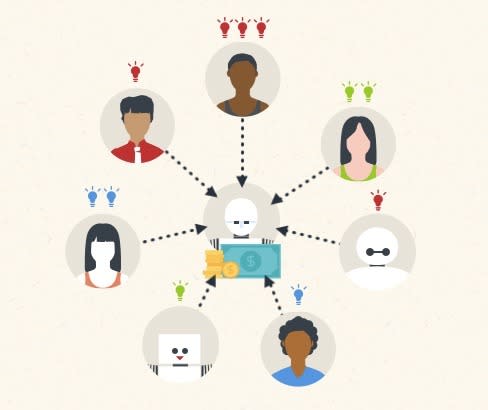Yahoo Tech’s Top 10 Predictions for 2016
What’s going to happen to the tech world in 2016? While of course no one really knows for sure, it’s possible to make a few semieducated guesses. Here are 10 predictions for the biggest tech trends for the coming year — from the blindingly obvious to the wildly speculative.
1. Apple will unveil a new Watch and a new iPhone

One artists’s concept of the upcoming iPhone 7. (Photo: Yahoo News)
This is the easiest prediction in the world, which is why we started with it (guaranteeing that at least one of these will be right). Apple is expected to release Apple Watch 2.0 sometime this spring, we hope with an improved interface and a lot more apps. And next fall will see the release of the iPhone 7, which (if rumors are to be believed) will include a fingerprint sensor on the screen, wireless charging, multiple cameras, and a USB-C port instead of power or headphone jacks.
2. Apple’s dominance of tech culture will decline
Since the Second Coming of Jobs in 1997, interest in all things Apple has been climbing at a steady rate, going into hyperdrive with the release of the iPhone (2007) and then the iPad (2010). Lately, though, the products coming out of Cupertino have been less than magical and life-changing.
And for all of Tim Cook’s many fine qualities, he can’t generate a reality distortion field the way his predecessor could. Until Cook manages to pull another rabbit out of his iHat — an Apple Car? a fully integrated smart home? — the Apple mystique has clearly peaked. Nowhere to go but down.
3. Virtual reality will finally be real — and most people will go ‘meh’

Yahoo Tech’s Dan Howley tries out an early version of the HTC Vive. (Photo: Yahoo Tech)
After nearly four years of teasing us, the Oculus Rift VR headset will finally reach consumers this year, probably some time in the early spring. HTC’s Vive and Sony’s Playstation VR (formerly Morpheus) will likely appear a few months after that. And no matter how awesome they are — and odds are they will be pretty awesome — very few people will buy them.
Why? They’ll likely be expensive, require vast amounts of computing power, and be limited mostly to games and porn (ewww). The fact is, after four years of hype, VR headsets can’t possibly live up to expectations. And then there’s the whole after-15-minutes-you-feel-like-puking factor (10 minutes if you’re watching porn). VR will find a niche audience, at best, for a long time to come.
4. AR will beat up VR and steal its lunch money
While the world oohs, ahhs, and hurls over VR (but doesn’t buy it), Augmented Reality (AR) will infiltrate all kinds of industries, from design and engineering to architecture, education, and medicine. Why? Being less immersive — you can actually see the world around you, as well as virtual objects — makes AR much more practical.

What the world of HoloLens looks like when you’re wearing one. That coffee table is real; the Minecraft house sitting on it is not. (Photo: Yahoo News).
Microsoft just released a new version of its HoloLens and will begin shipping $3,000 HoloLens development kits this spring. Google Glass will also emerge from the rock it’s been hiding under since its ill-fated debut, most likely aimed at industrial use.
5. Comcast will try to acquire Netflix — or possibly vice versa
Whether or not you’re a cord-cutter, streaming media is the future of entertainment — and nobody streams bigger than Netflix, which accounted for nearly 40 percent of all Internet traffic last year. Since big cable can’t beat the streamers at this game, the only thing left is for it to join them by acquisition; Comcast ($192 billion valuation) and Netflix ($42 billion) are the most logical candidates for an arranged marriage. While it stands to reason that the larger company will swallow the smaller one, it’s not inconceivable that the reverse will happen — not unlike AOL’s acquisition of Time Warner 15 years ago, but perhaps with better results.
6. Anti-drone technology will rise

Battelle’s anti-drone gun uses radio waves, not buckshot, to take drones out of the air. (Photo: Battelle)
The only thing people love more than reading about drones is hating them — witness all the cheering when a Kentucky man blasted one out of the sky with his shotgun last July. (Not to mention all the animals that love to attack drones.) Look for companies to come up with anti-drone technology that use nonballistic methods of ridding the flight zones of these pests. Let the games begin, and let the odds be ever in the anti-drones’ favor.
7. Facebook will continue to eat the world
The Facebook juggernaut will continue, though most of its membership growth will be overseas. However, expect a public backlash as Facebook assumes just a bit too much control over the media it arbitrarily delivers to everyone’s feeds. How many autoplay videos of bacon, egg, and cheese bread boats can one person watch?
How to make a bacon, egg, and cheese breadboat was Facebook’s most popular video in 2015. Anyone else hungry? (YouTube)
8. Cyberterrorists will attack the Internet
We’ve seen targeted hack attacks on a massive scale, and we’ve seen state-sponsored cyberespionage. In 2016 we will see them converge, with a direct attack on the Internet infrastructure motivated by politics, not greed or misplaced juvenile aggression. Time to back up your data, encrypt your hard drives, and stock up on beef jerky and tinfoil.
9. There will be an Uber for friends
Need a date for a party or someone to hang with at a ballgame? Just share someone else’s. The design firm Frog predicts the rise of “friendship as a service” in 2016. We liked that prediction so much we decided to borrow it. Isn’t that what the sharing economy is all about?
10. Your next boss may be an algorithm

The Ethereum platform allows bots to post jobs, find qualified workers, and pay them when the work is done using virtual currency — no puny humans required. (Image: Ethereum Frontier)
Artificial intelligence will continue to be baked into an increasing number of devices and services. More than that, though, entire companies may be built around self-running programs, with business decisions made without any human intervention. Think we’re joking? The first decentralized organizations are already being developed for the Ethereum Frontier network. We have met our robotic overlords, and we’d like a 10 percent raise and more flex time, please.
Dan Tynan predicts he will be moderately hung-over on Jan. 1, 2016. Commiserate with him on Twitter.
